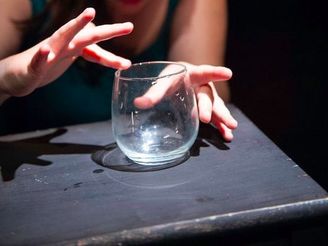Lyric Essays
Exploring animism, embodiment, deep ecology, vulnerability, and imagination . . .
 Photo Credit: Bruce Silcox Photo Credit: Bruce Silcox “The poetic is humans encountering things bigger than themselves,” a mentor told me once. My immersion in Lecoq-based theatre was an incredible apprenticeship to "the poetic," those gestural images created in performance that transpose the audience into a different reality. The poetic carries you into a dreaming state, a space of enacted longing. Here, times coexist, consuming emotions are expressed, and inner lives are witnessed. In these moments, acts of aisthesis take place—a kind of soul essence passing between audience and performer. As silences thicken and deepen, the listening itself becomes a palpable tension, a substance conjured out of shared breath. An audience must be engaged in a story, it has to touch their lives. Yet onstage what we see is not real, and paradoxically, the clearer the imaginative construct, the more real the piece can become. Which is why poetry, not just verbal poetry, but the poetic conjunction of what we see, is essential in the theatre. The poetic is a child’s play of transformations. An empty chair becomes a person to converse with, a book takes flight as a bird. The poetic is the realm of metaphor, which literally means "carrying over." Words—but much more than words…gestures, images, sounds—become a vessel to carry something ineffable. Lakoff and Johnson describe how we live our lives through the lens of conceptual metaphors—an argument is a fight, time is money—so the stories that we tell ourselves become the realities that we inhabit. The poetic is the tension between sides of a paradox…something vibrates, something comes alive. This is perhaps at the very core of the poetic, because the “something bigger” is in itself alive. Whether it’s an image, a gesture, an emotion, an elemental force… the poetic brings a living presence into the room. It uses the flashlight to conjure live lightening, the rustling piece of paper to create the forest. The poetic teaches us again what children know naturally: "reality" is malleable and you are only constrained as far as your imagining. Let the audience create their own connections. Just as we make our own connections when we remember. For memory itself is, as we now know, not a complete thing waiting to be downloaded at the appropriate moment like a computer, it is literally made anew each time we remember. Memory is imagination. The poetic is indirect. It is a way of gesturing towards something that cannot be fully contained. It is not symbols in neat packages, but presences alive and wild—the ocean inside of the glass of water. The human becomes a vessel, a conduit, for something that flows through us and back into the world, giving, in that single moment of inhabitation, a glimpse of the vastness of its unconfined form. When you watch performers in Philippe Gaulier’s classes fully succeed in Greek tragedy, you see them reach "the poetic." They open to a power that doesn’t appear to fit in their bodies, an aliveness so vast it needs an audience to contain it by witnessing. “Poems, even when narrative, do not resemble stories. All stories are about battles, of one kind or another, which end in victory and defeat. Everything moves towards the end, when the outcome will be known. Poems, regardless of any outcome, cross the battlefields, tending the wounded, listening to the wild monologues of the triumphant or the fearful. They bring a kind of peace. Not by anaesthesia or easy reassurance, but by recognition and the promise that what has been experienced cannot disappear as if it had never been…The promise is that language has acknowledged, has given shelter to the experience [that] demanded, that cried out.” The poetic is a window into the realm of felt meaning. The way that babies see the world before limiting blinders are placed on them: each object they encounter a unique being, not yet condensed into the realm of categories. The world feels more alive this way. Each thing has its own soul essence, its own distinct personality. The world has a depth and complexity we block out as we become conditioned by this culture.
What I realize now is that, in apprenticing myself to the poetic in theatre, I have found a home in which a much older wisdom had taken shelter. Theatre, at its most radical (root), is a refuge for animism, a refuge for the sacred, the mythological. It’s a refuge for the old relationships with nature, with elemental forces, with the depth of our own emotions. When we realize that the wounds of our culture are rooted in the lacking of those relationships—the reverence and reciprocity of embedded existence, the rituals we must enact to care for our place within the natural systems, the simultaneous need for expression and witnessing—then we realize the incredible power that theatre is attempting to channel. Theatre can be itself that poetic vessel for something much bigger than ourselves.
2 Comments
11/12/2022 04:16:56 pm
Edge car financial.
Reply
Leave a Reply. |
About
My curiousities entwine around the concept of “mythopoiesis" — literally "myth-making" — the creation of mythologies that nourish our interbeing with the earth.
My writing explores the betweenesses of different fields—deep ecology, indigenous wisdom, trauma resilience, living process, cultural transformation, sacred activism, grief rituals, play . . . I am learning how to become a connoisseur of the felt sense, a savorer of the moments that create meaning and nourishment in the world. I am apprenticing to traditions that practice compassionate witnessing, creating containers in which it is safe to release into the depths of emotion, to traverse the grief and holdings that must necessarily be released before healing can begin to take place. Archives
February 2017
|